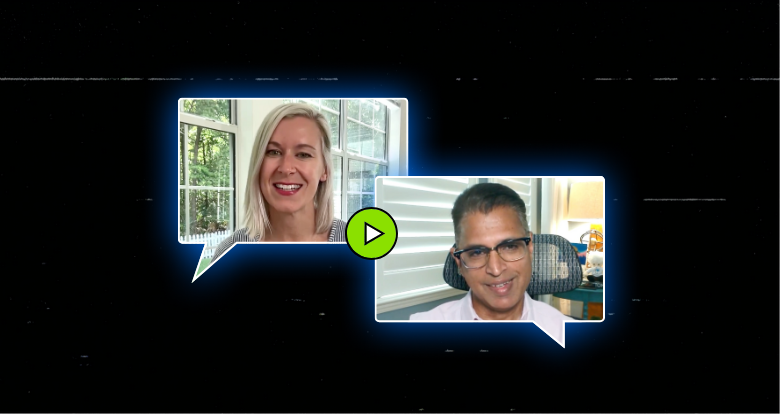Welcome to Speed Data: Quick Conversations With Cybersecurity Leaders. Like speed dating, our goal is to capture the hearts of CISOs with intriguing, unique insight in a rapid format for security professionals pressed for time.
In this special Speed Data episode, Mike Taylor, Hospital Ship Joint Task Director for the U.S. Department of Defense, discusses his role in information security for USNS Mercy and USNS Comfort. He shares insights with host Megan Garza on managing security for floating healthcare facilities and challenges traditional perceptions of military ships.
Military ships providing humanitarian aid
When people think of military ships, they typically imagine adventure, warfare, or the game Battleship. Empathy and compassion aren’t usually what comes to mind. However, for Mike Taylor, who manages the CIOs for the hospital ships USNS Mercy and USNS Comfort, his favorite part of the job is helping others.
“Real people, kids, etc. come onto the ship and get healthcare that’s not available in their countries,” the Hospital Ship Joint Task Director for the United States Department of Defense said. “We train their doctors too, and it’s unfortunately a story that’s not really told about what our military does and how we take care of others.”
Mike deploys with the ships whenever they are activated, whether for a combat casualty response or humanitarian mission, spreading goodwill by helping other countries with healthcare and disaster preparedness.
It’s been an interesting and fun ride doing deployments with the ship taking healthcare around the world.
Mike Taylor, Hospital Ship Joint Task Director for the U.S. Department of Defense
USNS Comfort and USNS Mercy alternate activations every other year to provide healthcare to the four corners of the world.
USNS Comfort participates in the humanitarian mission Continuing Promise. “They go to South America and take healthcare down there to help people,” Mike said. USNS Mercy participates in the Pacific Partnership, deploying in opposite years to provide the same services in Southeast Asia and the South Pacific.
We take America’s talented healers downrange to help other people in different parts of the world.
Mike Taylor, Hospital Ship Joint Task Director for the U.S. Department of Defense
Additionally, when U.S. government agencies call on the ships for aid, the hospital vessels have five days to activate in the event of an emergency or request.
“The COVID mission was a great example. We had five days to get everything we needed — the right people, the right specialties, everything a hospital needs — and then get underway.”
The unique challenge of securing healthcare information on ships
As Hospital Ship Joint Task Director, Mike oversees all IT operations for the USNS Comfort and USNS Mercy. Additionally, he plays a significant role in the development of new hospital ships, a task that goes far beyond standard information technology responsibilities.
“You come on the ship, and it’s just like going to an office, which is weird because you’re in a moving platform, but you’re actually inside a hospital,” Mike said. “It’s just like you’re at a brick-and-mortar hospital, except you move.”
To remain vigilant against potential attacks, Mike manages routine IT activities like monitoring the ship’s network and assessing the condition of file shares.
“We have to make sure that we stay ahead of any threat actor, but inherent to staying ahead is also your daily IT tasks: checking your network, looking at the health of your file shares, network access control, the basic stuff, and Varonis is a big part of that.”
Mike is also responsible for addressing the specific security challenges of managing a floating military structure.
“The ships do have unique risks because they go all around the world, and we have lots of people from foreign countries come on the ship — not just as patients, but also with tours — and not all those people have good intentions,” Mike said. “A lot of them see a U.S. flag and think it’s an opportunity to take advantage, so we have to stay ahead of those kinds of threats, too.”
“It’s a very dynamic and challenging environment. We have to be prepared for everything — random people on a tour trying to plug a USB stick into a PC as they walk by a nurse’s station, insider threats from not only people who work on the ship but military people who might not be happy with whatever situation… we have to guard against that as well.”
Varonis provides essential data security for the healthcare industry.
Mike pointed out that data security is especially crucial in the healthcare sector.
“Something that may disrupt a PC in a surgical suite during a procedure could have dire consequences,” he said. “So it’s not just making sure things are patched; it’s making sure nothing can even get to this part of my network because I’ve got everything protected, and nothing is going to create an additional risk to patient safety.”
He and his team rely on Varonis to alert the military ships to abnormal or suspicious activity.
Varonis has helped us with lots of documented occasions of anomalous behavior, email attachments, or shared drives.
Mike Taylor, Hospital Ship Joint Task Director for the U.S. Department of Defense
“Varonis has helped us to stay ahead of some of those threats,” Mike said. “It’s a daily challenge, but by leveraging intelligence and tools, we’re able to take our small teams on the ships and make sure they’re always ready for anything that comes our way.”
When we take the ship away from the pier, all we have is ourselves and whatever security we’ve implemented along with us.
Mike Taylor, Hospital Ship Joint Task Director for the U.S. Department of Defense
Additionally, USNS Comfort and USNS Mercy must protect the ship’s digital infrastructure from attack.
“On hospital ships, it’s not just healthcare. It’s also things like the ship’s navigation and all of that,” Mike said. “Everything is digital nowadays, so any disruption to the environment also takes away from our civilian mariner’s ability to safely drive the ship and keep engineering running.”
Using technology to tackle problems
Mike's favorite aspect of his job is innovating in information technology and using technology to solve global challenges.
Being a driver of technology is always fun. IT gets to look at creating elegant solutions and driving technology to implement those solutions.
Mike Taylor, Hospital Ship Joint Task Director for the U.S. Department of Defense
“You go to trade shows and see all this new tech, and yeah, they’re cool toys, but at the end of the day, they were developed to drive a solution for a problem.”
Varonis uses AI data classification capabilities to drive solutions for our customers’ data security challenges. Our LLM-driven data scanning gives organizations deeper business context with unmatched precision and scale to automatically discover, understand, and categorize unique data better than ever.
What should I do now?
Below are three ways you can continue your journey to reduce data risk at your company:
Schedule a demo with us to see Varonis in action. We'll personalize the session to your org's data security needs and answer any questions.
See a sample of our Data Risk Assessment and learn the risks that could be lingering in your environment. Varonis' DRA is completely free and offers a clear path to automated remediation.
Follow us on LinkedIn, YouTube, and X (Twitter) for bite-sized insights on all things data security, including DSPM, threat detection, AI security, and more.





